

Parenting with Pete: The right time to discuss internet safety with your kids. Micheila Blache, 5, reads with her mother, Leela Blache on Mar. 27, 2013 Alyssa Ki/The Jersey JournalAlyssa Ki/The Jersey Journal Far-reaching government monitoring of the Internet has dominated the news in recent days.
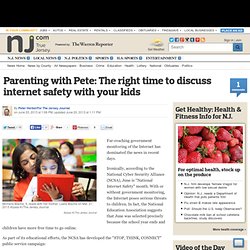
Ironically, according to the National Cyber Security Alliance (NCSA), June is "National Internet Safety" month. With or without government monitoring, the Internet poses serious threats to children. In fact, the National Education Association suggests that June was selected precisely because the school year ends and children have more free time to go online. As part of its educational efforts, the NCSA has developed the "STOP, THINK, CONNECT" public service campaign: Stop to consider potential risks before going online. It has been said that children "live" in cyberspace while parents "visit. " Now parents must give their children two safety talks: the "sex" talk and the "Internet" talk.
Parents & Guardians. Privacy at Work (and Home) Stay Secure Online: Stay Safe from Cyber Attacks - Symantec. Resolving Identity Theft? How to Help. Four Things you need to do if your Facebook account gets hacked. If you are the unfortunate victim of a “Facecrook”, and your Facebook account gets hacked, there are several steps you can take to reclaim your account and your get your Facebook life back in order. 1.

Attempt to Reclaim your Account -If your account has been hacked, your best bet is to visit the Facebook Help Center and attempt to reclaim your account. For more information about keeping your account secure, visit this Facebook Faq. 2. Change your Passwords – The hacker obviously gained access to your email address and password somehow, so you need to make sure you change the password to your email address immediately. 3. 4. Lastly, take a deep breath and try not to panic! STOP. THINK. CONNECT. Welcome ¦ Stop Think Connect.
Protect Yourself This Semester with Cybersecurity Tips from Malwarebytes. August 26, 2013 | By Cecile Nguyen | | Share What happens when you bring millions of 18- to 24-year-olds onto college and university campuses and have them connect to shared networks?
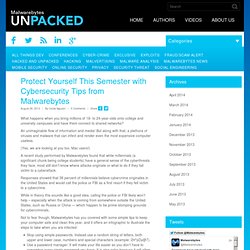
An unimaginable flow of information and media! But along with that, a plethora of viruses and malware that can infect and render even the most expensive computer useless. (Yes, we are looking at you too, Mac users!) A recent study performed by Malwarebytes found that while millennials (a significant chunk being college students) have a general sense of the cyberthreats they face, most still don’t know where attacks originate or what to do if they fall victim to a cyberattack.
Responses showed that 38 percent of millennials believe cybercrime originates in the United States and would call the police or FBI as a first resort if they fell victim to a cybercrime. Stop using simple passwords. Explore more infographics like this one on the web’s largest information design community – Visually. Middle & High School. Teach Online Safety. Key concepts for students to understand and apply to their online experience.
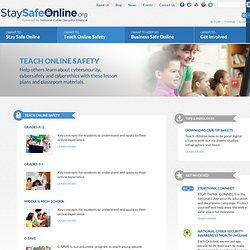
C-SAVE is our volunteer program to teach young people cybersecurity, cybersafety, and cyberethics. It's easy to participate and use! When you start college, you're taking on new responsibilities, making your own decisions, and becoming part of the campus community. There is an important role that you can play in your college's cybersecurity efforts that combines these elements of responsibility, decision-making, and community. Every person in the school community has a role in keeping the Internet safe and secure. Interested in starting your own community-based cybersecurity awareness program? How to Introduce your Kids to Social Media. Social media is everywhere.
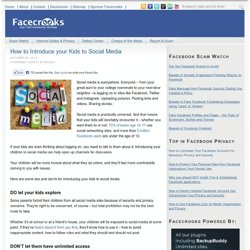
Everyone – from your great aunt to your college roommate to your next-door neighbor –is logging on to sites like Facebook, Twitter and Instagram. Uploading pictures. Children, teens and social networking. Social networking is a fun way for kids to interact, make plans and share information.
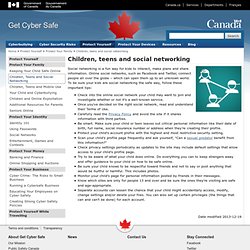
Online social networks, such as Facebook and Twitter, connect people all over the globe – which can open them up to an unknown world. To be sure your kids are social networking the safe way, follow these important tips: Check into the online social network your child may want to join and investigate whether or not it's a well-known service. Once you've decided on the right social network, read and understand their Terms of Use.
Carefully read the Privacy Policy and avoid the site if it shares information with third parties. Infographic: Kids on the Internet. Kids on the Internet -Kaspersky Daily. During the summer holidays, your kids will spend their time not only in parks and on seaside beaches, but a majority will also spend their time on the Internet.

That is why you need to pay more attention to their online activities. Our analysis clearly shows that kids encounter inappropriate content on a regular basis, moreover – they are actively looking for it. The activity graph is different for each country analyzed, e.g. Japanese kids are not that active in new kinds of social media and prefer “traditional” forums, while 60% of Russian teenagers seek forbidden content in local social networks. Nevertheless, worldwide statistics show that most inappropriate content is still found via social media with porn sites holding second place.
Cyberbullying.